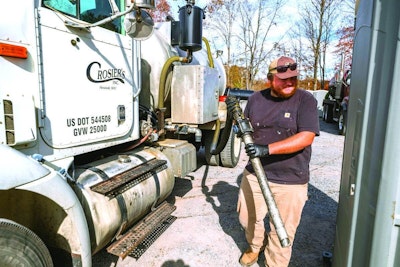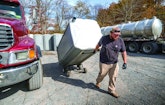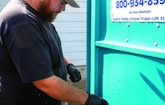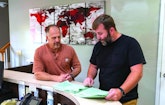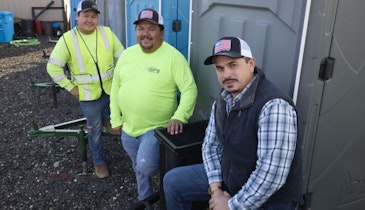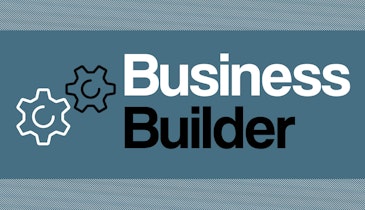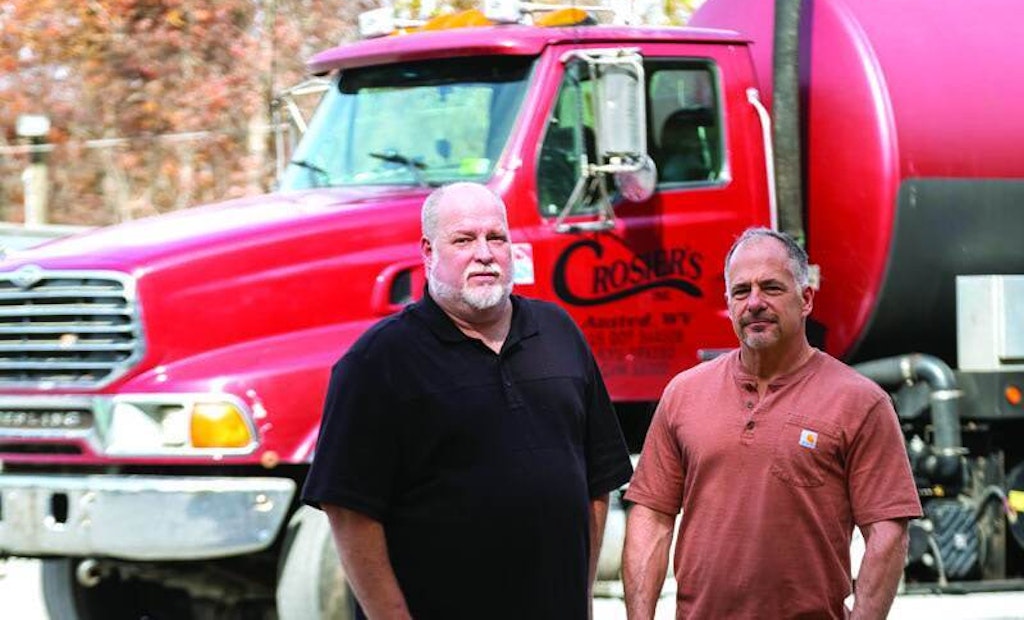
General Manager Chip Herrald, left, and owner Ron Crosier are shown in the company yard. The fleet of vacuum trucks was built out by Satellite Vacuum Trucks and Imperial Industries, all using Masport pumps. (Photos by Kevin Blackburn)
Interested in Restrooms?
Get Restrooms articles, news and videos right in your inbox! Sign up now.
Restrooms + Get AlertsCoal mining was once the heart of Crosier’s Inc. portable sanitation business.
Located in Lansing, West Virginia, Crosier’s had reliable business with the area’s many coal mines, which could need as many as 30 restrooms on site year-round. But as the coal industry declined, Crosier’s has been forced to adapt. It may no longer have mining operations as key customers, but the portable sanitation side of the company has remained strong through a focus on cost-efficient operations, special events and other tourism endeavors in the area.
For example, since 2012, Crosier’s has serviced the Boy Scouts of America’s National Jamboree, as well as on occasion a World Scout Jamboree — two-week-long events that have the company servicing as many as 1,000 units daily.
“Coal was huge. It was a really big piece,” says Chip Herrald, who joined Crosier’s as general manager in 2017 after working in the coal mining industry. “The entire coal industry has taken it on the chin, and as a result, they’ve closed a lot of operations down. We still service some, but it’s not what it used to be. So we try to stay proactive on getting new customers in other areas.”
DECADES OF SERVICE
Crosier’s was founded in 1964 by John Crosier, who eventually passed the company on to his son, Ron, in 1995.
In 2017, Ron brought Herrald on board as general manager to free him to work on a separate company of his, Downey Ridge Environmental, which developed Greasezilla, a system for producing biofuel out of grease trap waste.
“I knew Ron socially, and coal had just been really erratic, not a dependable industry anymore. I was looking for a change, and Ron said I should try my hand at the portable sanitation business,” Herrald says. “He realized he needed more time to focus exclusively on Downey Ridge Environmental and have someone else look after Crosier’s for him.”
Crosier’s has 16 employees, all capable of switching between portable sanitation and septic/grease work on where they’re needed any given day.
On the portable sanitation side, Crosier’s runs four vehicles — three International trucks and one Peterbilt, all sporting Masport 75 pumps and tanks of 1,200-gallon waste and 300 to 500 gallons of freshwater. The trucks were built out by Satellite Industries and Imperial Industries.
The restroom inventory includes 750 Satellite units. Hand-wash stations number 55 and are also mostly from Satellite.
TIGHTER ROUTES
Cost-effective operations have been key to Crosier’s success. In recent years, the company has focused on reining in its service routes to avoid areas where the number of units no longer justifies the travel time and fuel costs.
“We’re trying to get closer to home,” Herrald says. “We’re very rural here in West Virginia, and sometimes we were finding ourselves traveling quite a bit just to service a handful of units.”
For a better unit density, Crosier’s maintains nine service routes and now stays within about a 50-mile radius of its home base rather than the 80-mile distance it had been keeping. Herrald says the goal is to have at least 40 units to service on a route.
“Companies that operate in big urban centers, they can get hundreds of units in a 2-mile radius of their shop,” Herrald says. “Given our service area, 40 to 50 on a route is a good number. But we had been traveling 80 miles and servicing only 20 units. It wasn’t cost-effective.”
Driving the decision to tighten service routes was also the fact that new, smaller restroom companies have been popping up in recent years that Herrald says are better equipped to handle these farther-to-reach rural areas.
“There are a lot of other people getting into the business who are just buying 20 to 30 units and one truck and operating it all themselves, kind of just servicing their own backyards,” Herrald says. “We’re now leaving some of these places for smaller companies that are already in the area. More power to them. We can’t afford to travel to them anymore. There’s plenty of business to go around. If we notice sales falling off in a certain area, we just kind of let it go.”
Since making major adjustments to service routes, Herrald says fuel use is down about 17%.
“I’m still working out the numbers on other savings like truck wear and tear, but just looking at the fuel use, that’s huge given what the price of fuel has been,” Herrald says.
EMPLOYEE INPUT
Crosier’s employees are also key to the company staying operationally efficient. Herrald says he and the operations manager consult regularly with route drivers to become aware of any issues and make sure routes are being tackled in the best way possible.
“Routing software is going to spit out something based on GPS coordinates and it’s going to get it right within 80%, but there’s going to be a lot of things that routing software doesn’t know — one-way streets, road closures, bridge construction. All these things going on that make you alter how you have to run the route and still stay profitable,” Herrald says. “So we’re constantly catching guys when they come back in off a route. How’d it go today? Where are you having issues? Can I help you with something? We’re super involved in trying to keep them efficient because that’s where a majority of our cost is.”
EVENT FOCUS
With the departure of a lot of the coal mining business, Crosier’s has found success working in a variety of areas. Construction is a top one. West Virginia’s tourism industry also requires a lot of portable sanitation services. Camping is increasingly popular, particularly with new ATV trails in the southern part of the state.
“We’re trying to marry up with that industry to make sure their campgrounds are covered,” Herrald says. “They have plenty of portable sanitation needs, and a lot of them haven’t thought much about what they need.”
Spring through late fall is whitewater season, and Crosier’s does a lot of business with rafting companies. Many of the companies keep a couple dozen units on site almost year-round.
Then there are special events, which Herrald estimates make up about a third of the portable sanitation business. Crosier’s handles about 225 events a year, covering the entire spectrum from small family reunions to large gatherings that require an all-hands-on-deck approach and 1,000 units.
“We don’t just service the events that come up. We’ve also tried to help with ideas for more events to attract tourism to the state,” Herrald says. “Just working with the tourism departments in the state and the local chambers of commerce to throw out ideas. I don’t take a super active role, but we’re definitely involved in those talks and provide whatever we can to help them figure out if something is going to be a viable project or not.”
1,000 UNITS A DAY
One of the largest events for Crosier’s is the Boy Scouts of America’s National Jamboree, which occurs every four years. The company has also occasionally done the World Scout Jamboree.
The next National Jamboree is scheduled for West Virginia’s Summit Bechtel Reserve in late July, requiring about 800 units serviced daily for two weeks. The number is closer to 1,000 for a World Jamboree.
“It’s quite an undertaking,” Herrald says. “Basically, our guys work two straight weeks without a day off, but they love it. We always receive a lot of accolades from the Boy Scouts for the job we do and our guys are super proud of that. They wear it as a badge of honor that we do this because typically, the size of a company that would do something like this would be much larger, like a national company.”
To supply the number of units the event requires, Crosier’s has to get creative since much of the company’s 750-unit inventory is usually out on a route or another event. One tactic is to partner with other restroom companies that have recently placed a large restroom order. Crosier’s will instead accept the order, assemble the units, pay the other company a fee to use them at the jamboree and then also pay to ship them after the event is over.
“When they receive the units, they’ll already be assembled, ready to go and only used on this one event so they’re still basically getting new units. That’s one strategy that has worked,” Herrald says.
Crosier’s has also gone the route of purchasing the necessary extra units itself and immediately putting them up for sale after the event is over.
“For example, we don’t need to have on hand the amount of handicap units the jamboree requires,” Herrald says. “It’s not cost-effective for us to buy them and just hold them in the inventory because they’re only going to make money every four years.”
Winter of the prior year is when Herrald says he typically reaches out to the Boy Scouts to get planning underway, even if the finalized contract isn’t yet in place.
JAMBOREE LOGISTICS
“We start having discussions, very preliminary, just to try to get as much data as I can from them since I have to do some finagling to get the units to do the job,” Herrald says. “They usually have some good data at that point, but as with anything, a lot of changes are made right up until the bell.”
During the event, Crosier’s maintains 24/7 service with two 12-hour shifts running for the two weeks. “We have to have full coverage around the clock, just in the event there’s an emergency,” Herrald says.
The two shifts have different focuses. About three-quarters of the units are placed at “action areas” where all the activity is occurring during the day. The remaining units are in the campground areas where attendees return to at night. The day crew is responsible for the campground units, when attendees are spending time elsewhere. Then the night crew heads out to the “action areas” when people are back at their campsites.
“We have a beefier team on the night shift to get everything done since the action areas are where a majority of the units are located,” Herrald says. “But the tradeoff is that during the day it is harder to get around because of all the foot traffic. It’s slower to get everything serviced. You’re looking at 45,000 to 60,000 people there on any given day. To go from Point A to Point B, you’re literally at a snail’s pace because there’s foot traffic everywhere.”
It takes seven service vehicles and a crew of about 25 — the entire Crosier’s team plus some additional recruits. Even some office employees assist with tasks like restocking toilet paper. The company still has to maintain its other business, so one worker handles grease trap pumping and two employees run restroom routes. But if possible, all septic pumping is scheduled around the jamboree so that most Crosier’s workers can stay focused on the event for 14 days.
“That type of thing happens all the time,” Herrald says. “Employees know that they might be a grease pumper today and tomorrow they’re delivering toilets. Everyone knows they wear many hats and are perfectly willing to pitch in to do what needs to be done. With these large events, there are times in this company where everyone is a toilet guy.”
LOOKING AHEAD
Herrald’s joining the company in 2017 was partly because of his experience in the coal industry.
“Ron wondered if, with having me around, maybe we could find a strategy where we could increase our presence in the coal business and get back to where it used to be,” Herrald says. “But the economics just weren’t there.”
Rather than trying to restore the past, Crosier’s has instead found success elsewhere. Special events in particular are an area Herrald says he sees the company continuing to focus on for future growth. Events like the Boy Scouts of America’s National Jamboree are a testament to Crosier’s capabilities.
“The fact that we were able to get the contract and figure out a way to manage it being a small pumper company, we’re proud of that,” Herrald says. “We’re proud that we’re able to compete on that level.”
